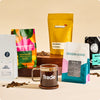Coffee touches dozens of hands before it ends up in your cup. So many people are involved in picking, processing, bagging, transporting, importing, and roasting coffee — and at each step, someone is either imparting or passing down information to the next person. As you can imagine, the journey a coffee takes to get to you can feel like a long game of telephone, with information getting lost as it moves linearly along its path.
The COVID-19 pandemic jolted the way farmers and roasters communicate and share information, and the process of gaining valuable insights about a given coffee feels much more like an interconnected web rather than a singular line. Producers are on Instagram sharing stories on their farms; roasters have phone numbers you can text for brewing insights and help; importers sell coffee using WhatsApp and other communication interfaces — each of these tools has helped foster connections throughout the coffee supply stream and enabled people to learn valuable information about the coffee they love.
Information is powerful, especially for small businesses. Today we’re talking to five actors along the coffee supply chain and asked them how technology has changed the way they communicate with their roasting and farming partners — and most importantly, the people drinking their coffees.
These interviews have been edited for clarity.
Cynthia La Rue, Finca La Plata, Nicaragua
Cynthia: I am a fourth generation coffee farmer. We’ve been farming on the same mountain for 117 years and the farm has been passed down from my great-grandmother to my grandmother to my mother to me.
I was at a coffee competition with the Taiwanese delegation and when I got to the final negotiation round, they said they loved my coffee but where were the pictures? I went into my phone but of course, no one can see what’s on my phone unless I’m with them and sharing it, so I knew I had to figure something else out.
Facebook didn’t get a lot of traction, so I moved to Instagram. And at first it was a place to show pretty pictures from the farm—things that I considered to be a nice shot, right? But then it quickly became a tool to help people understand.
Often, you’ll hear me say, “with my boots on the ground.” A few years ago, we shifted from commercial to specialty coffee, and Instagram became a tool to help people understand what it means to be a specialty coffee farmer. What are the processes we use for our coffees? How do we communicate the year long cycle? It’s not just about harvest season, not just about pretty red cherries, but it’s about what really happens on the farm day to day.
There are a lot more stories to be told and not just necessarily show what we do, but why we do what we do. And the audience responds incredibly very well to a little bit of insight.
When I started engaging on Instagram, I noticed three things: one, I was surprised that other farmers started following me and partly that they're learning what I do and how I do it. Once you start connecting and making friendships on Instagram, it's amazing the parallels. For example, I’ve connected with farmers in India because we're on the 13th parallel (line of latitude). When we have weather events and they have weather events, we have a lot to share. I am exchanging a lot of information with a lot of specialty farmers in India because we happen to have a lot of similarities to what’s happening in Central America—that it's happening to them.
The second thing I noticed is how I connect with roasters. One of our partners is Girls Who Grind Coffee in England. We use technology both to help them understand what we do on the farm, but also because they tell my story on their boxes. Their clients are often asking about who I am and what I do, and it's a perfect place for them to connect to. Roasters are able to ask deeper, more interesting questions.
Third, I connect with customers. Instagram brings the consumer way closer to the farm. As I spoke with Casey (of Girls Who Grind Coffee), consumers want to know not just where the coffee comes from, the altitude, etc … They want to know what drives you. And for me, a picture can tell so much more than what I can write on a box.
Karla Boza, Finca San Antonio Amatepec, El Salvador
Karla: If it wasn’t for Google, we would have never known what our coffee was selling for.
Instagram has allowed us to show people not only like the good things about our farm, but also the bad things that happen. It has helped to humanize our farm in a way—sometimes you have good days and successes and other days are harder. We also use WhatsApp to make deals because I’m on the farm and I can’t always be in front of my computer to answer emails. So sometimes messages will look like, “Here’s a picture of the farm—what price are you looking to buy this coffee? Great, how many bags do you need?”
But social media has been the main venue for us to be able to reach new clients and also stay in touch with not only the roasters that we sell coffee to, but also the people that they sell coffee to. So that has been pretty cool—to get feedback from coffee consumers, people who are not necessarily coffee professionals, just normal people. To have them tell us, “Oh, we like your coffee and we prepared it this way and that way….” that's been pretty cool. So I think that it's definitely been a major tool for us when it comes to selling our coffee.
Gabe Boscana, Máquina Coffee Roasters, Coatesville, Pennsylvania
Gabe: I’ve been using much more social media and email and WhatsApp communications as I couldn’t travel to origin. I think technology and flexibility with communication helps transparency. We have to make a greater effort since we cannot get to the farms as easily.
(Since COVID) I am having way more communications with customers. Having to use platforms like Instagram and video and Instagram Live has been great in really getting my story and brand out there and people have had more time to spend getting to know smaller businesses because they too were stuck at home.
I feel like Máquina really was able to attract more customers using more social media. I feel like I am connecting on a more real level because humanity itself was on display due to the pandemic. I hope we keep the positive changes we had to make during such tough times. I’m certainly more inclined to put more effort into real connections with customers and with producers.
Leticia Hutchins, Alma Coffee, Canton, Georgia
Leticia: Here at Alma we are huge on social media. We put a lot of time, effort, money into it as we feel it bridges the gap between farmers/roasters and coffee consumers. At Alma, we are in a unique situation as we started roasting in early 2019 so social media and technology has always been a part of our business model.
Alma uses technology for communication with our customers and showing them our day to day lives. Additionally we use it to run our business; our e-commerce platform, social media, administrative tasks, etc… I would say that technology has made communication easier because when customers have a question/idea/picture they want to share, they can do it so quickly via social media.
I wouldn’t say that technology has allowed us to do something we weren’t able to do before but instead I would say it allows us to share the intimate details of what we do. We can celebrate the wins with our online community and include them in decision making processes such as new merch items we are getting, naming our equipment, or participating in giveaways. It's a super cool thing to create a community online, we have people visit us all the time that know us personally from what they see online and it feels so good to be able to meet them back.
Caleb Nicholes, Wonderstate Coffee, Viroqua, Wisconsin
Caleb: A lot of our buying happens on email and WhatsApp. We work exclusively with small producers, and WhatsApp seems to be the most common communication tool. Most people have phones, so they can connect directly with us whenever they need.
We also use Instagram as a way to stay connected to some of our producers. It’s kind of sweet to have a real-time connection to what your small farmer producers are up to. It’s a way to connect customers to producers in a dynamic way. It’s more of a collaborative storytelling approach.
We’re about to release a coffee from Kenya from a producer named Peter John Mbature, who is very active on Instagram. It’s rare to be able to drink a coffee and then go on social media and be able to see the producer who made this coffee, so this release is going to be a cool way to bridge that gap.
--
At Trade, we work exclusively with small roasters who are working to connect directly with farmers. Please support these small businesses and help promote a more circular and interconnected coffee buying network.









